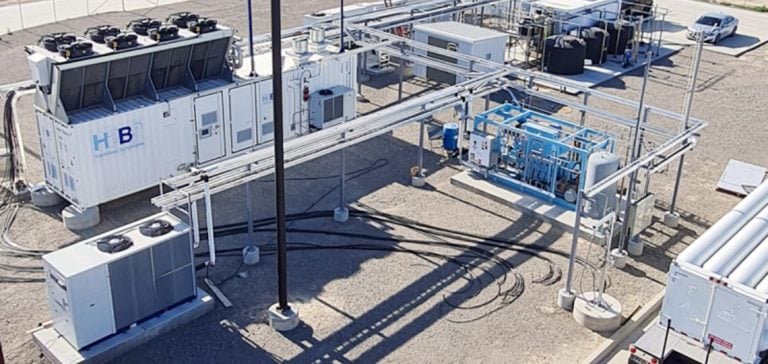The SoHyCal project, developed by H2B2 USA and 2G Energy, has been awarded the Combined Heat and Power Alliance’s 2024 Cogeneration Project of the Year award.
This award reflects the growing interest in renewable hydrogen solutions, particularly in California, a region where clean energy needs are crucial to achieving decarbonization goals.
SoHyCal uses an electrolysis-based hydrogen production process fuelled exclusively by renewable energies.
This hydrogen production technology is seen as an effective response to the problems associated with the energy transition.
Cogeneration, for its part, plays a key role in energy optimization, making the most of available resources.
The SoHyCal project is an example of how these technologies can be combined to provide a sustainable energy solution, without compromising on reliability or efficiency.
Hydrogen’s role in the energy transition
Renewable hydrogen is gaining in popularity in the energy sector, particularly for its potential to decarbonize the industrial and energy sectors.
SoHyCal’s integration of electrolysis represents a major step forward.
Electrolysis, which breaks down water into hydrogen and oxygen, when powered by renewable energy sources, enables the production of green hydrogen, essential for large-scale industrial applications.
2G Energy’s contribution lies in its expertise in cogeneration, which enables this type of project to be economically viable while reducing the overall carbon footprint.
The biogas engine used in the SoHyCal project has the capacity to generate electricity and heat simultaneously, contributing to a more efficient use of resources.
This energy model is particularly relevant for California, a region where energy policies are geared towards rapidly reducing greenhouse gas emissions.
A model for future projects
The SoHyCal project is part of a wider strategy to demonstrate the feasibility of renewable hydrogen solutions on an industrial scale.
As demand for hydrogen increases, particularly for use in the transport and heavy industry sectors, the technology developed by H2B2 and 2G Energy could serve as a benchmark for other similar initiatives.
It should be noted that the hydrogen market is booming, both in the United States and internationally, with competing projects seeking to capitalize on this energy resource.
Changing regulations in California, particularly those concerning climate targets, are playing a central role in structuring the hydrogen market.
State incentives for clean energy projects, such as SoHyCal, provide a favorable environment for the development of new infrastructures.
This dynamic could also extend to other regions facing similar decarbonization challenges.
Outlook for investment and regulation
The growing support of the Californian authorities and the targets for reducing emissions offer a unique opportunity for investors in the energy sector.
Projects such as SoHyCal demonstrate the importance of technological innovation in the evolution of traditional energy models.
Industry players are increasingly turning to partnerships to share risk and maximize the impact of new technologies.
However, the sustainability of these projects will depend heavily on the evolution of public policies and available funding.
Hydrogen regulation, and in particular its integration into national energy systems, remains a subject of debate in several jurisdictions.
The hydrogen market could see new legislative frameworks emerge, reinforcing wider adoption.
In California, these financial and regulatory incentives are facilitating the ramp-up of renewable hydrogen, which should encourage other regions to follow suit.
The potential impact of the SoHyCal project on the renewable hydrogen market could ultimately serve as a model for similar developments, particularly in regions where environmental and energy constraints are high.
Industry experts believe that this type of project could also play a key role in the decarbonization of European and Asian energy systems.






















